The business of scholarships: Reshaping Japan's learning landscape
To discuss scholarships in Japan, it's important to clarify the situation first. There are two categories: a 'benefit type' (no repayment required) and a 'loan type' (repayment required after graduation). Both of these are called 'scholarships' in Japan.

This interview is with Ryosuke Matsubara, President of GAXI, Inc. (株式会社ガクシー), a 'scholarship platform' for students, administrators, and funders.
According to the Cambridge English Dictionary, a scholarship is defined as 'an amount of money given by a school, college, university, or other organisation to pay for the studies of a person with great ability but little money'.
The situation in Japan, however, is that as mentioned above, despite being labelled as scholarships, many are in practice 'student loans'. Indeed, benefit-type scholarships form only a tiny fraction of the broader 'scholarship' category in Japan.
Recognising the current scholarship situation, GAXI's vision is 'Changing scholarships. Change destiny. Change society – Creating a new flow of money to expand the possibilities of young people.' To this end, the company is focused on increasing the dissemination of scholarship information and the provision of benefit-based scholarships. Matsubara discusses achieving social impact through business.
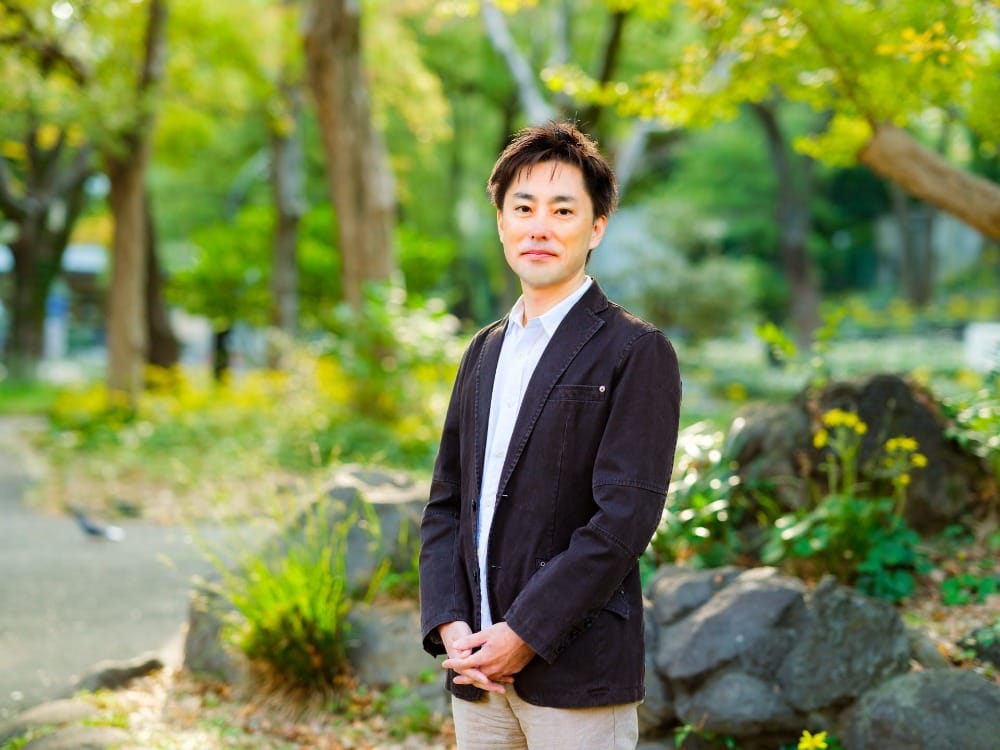
Challenges in the Japanese Scholarship Market
The inspiration behind GAXI's scholarship platform
(Yumiko: Tell us about GAXI, what kind of business do you do?)
Ryosuke Matsubara (RM): At GAXI, we are in the business of creating new flows of money that expand the potential of young people. Through our scholarship platform, GAXI, we provide services to students and parents (users), and offer a cloud-based scholarship management system, GAXI Agent, for universities, local governments, foundations, and other scholarship management organisations (operators and funders).
Through our business, we aim to realise a society where people do not give up on their dreams for financial reasons and, moreover, where those who take on challenges can transform and lead the world.
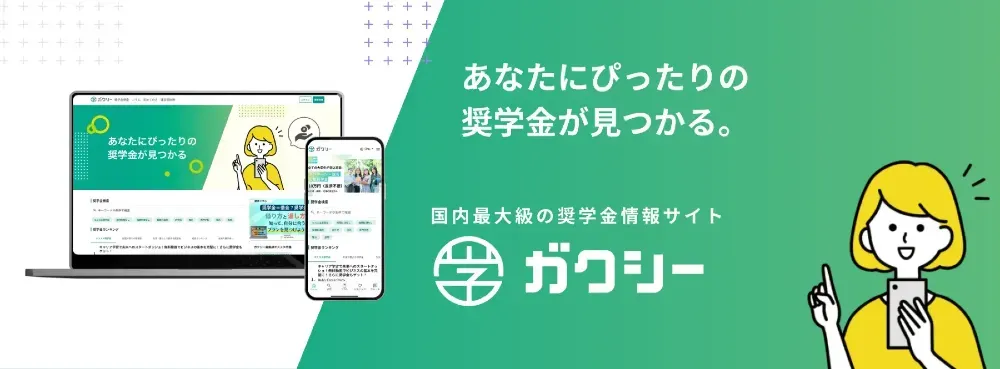
(Y: Tell us how you started GAXI)
RM: Before founding GAXI, I was involved in the global recruitment business and visited universities all over the world. I visited many different countries, including the US, Europe, Russia, and Brazil, to help Japanese companies recruit students from prominent overseas universities. I felt that overseas universities were better off in terms of student learning.
In Japan, for example, even postgraduate students at the University of Tokyo have to work part-time, reducing their research hours, to make ends meet with, say, ¥30,000 they have for spending money and living expenses.
On the other hand, you don't really find these worries at the best universities overseas. With this in mind, we were looking for support that we could offer to the young people of Japan, who will be responsible for the next 30 years, and which we could provide ourselves and which had not been offered before. That's when we discovered the market for scholarships. We are now in our sixth year.
Japan's 'scholarship market' covers only 10% of higher educational costs
(Y: What is the 'scholarship market' in your view?)
RM: In Japan, ¥1.6 trillion is distributed as scholarships annually, and we see this as the current scholarship market. On the other hand, the cost of high school and university education in Japan is roughly ¥16 trillion per year in tuition fees alone, and the current scholarship market only covers 10% of this.
As for GAXI, we are working on this in two stages: first, to create a convenient mechanism for scholarships like the platform; and then, to go on to fill the ¥16 trillion by creating new scholarships from untapped financial resources. Basically, nothing can proceed unless there is a source of funds first, so we want GAXI to be the one to develop that.
Another way of looking at the market is the figure of ¥180 billion when considering where the systems in our business are sold to. This amount is equivalent to the annual labour costs involved in scholarship operations. This is where we provide the system to improve efficiency and get paid for the use of the system.
(Y: Given Japan's current demographic structure, the youth population is indeed shrinking. However, viewing this from a certain perspective, the fact that it can become a vibrant market is quite unique. You are also looking at bequests from individuals.)
RM: Yes, that's right. In Japan, we have accumulated bequests worth ¥20 trillion, and I hope that some of it can be used for scholarships and support for young people. At the moment, even if you want to support young people, there isn't much money readily available for them because there isn't a convenient system. So, if this situation could be changed, I think many students would be helped.
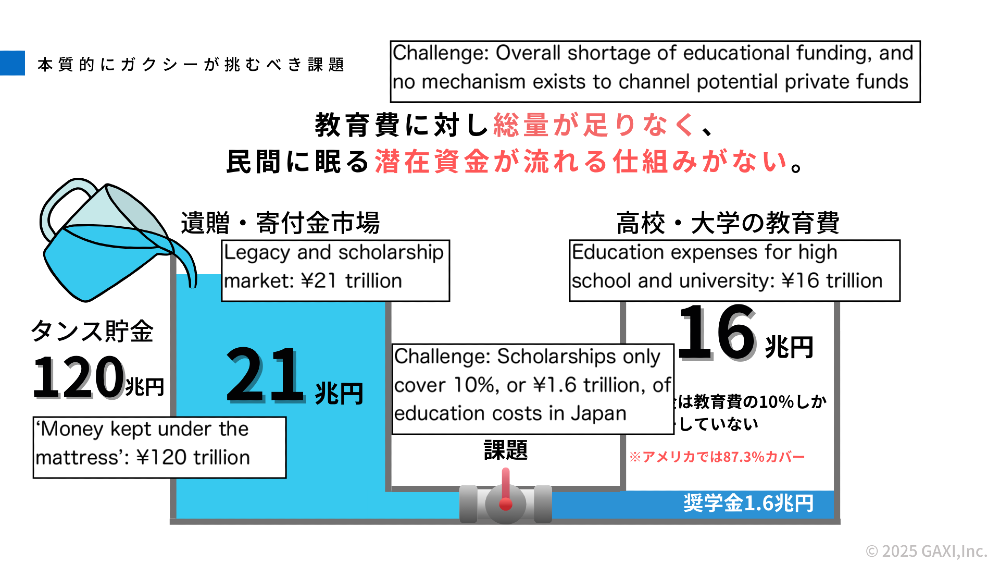
(Y: That's also related to financial gerontology*.)
RM: Yes, that's right. At first, I thought creating a new scholarship would be more spectacular and cool, but without a mechanism, it would be a one-off. 'We collected the money and distributed it, ' and that's that, which is not enough in terms of business and satisfaction.
Instead, we thought that a convenient mechanism should increase the number of participants. Providing support for young people is also in line with what society wants. If scholarship information is gathered on a platform, there will be a lot of companies and wealthy individuals who wish to provide support, and consequently, there will be a lot of students who want to receive scholarships, so the number of participants will increase.
Scarce scholarship information and analogous foundation operations
(Y: In considering the business, was it easy to find information?)
RM: There was none at all. I founded the company about five years ago, and to be honest, I was surprised that at that point, no website had all the information about scholarships that you could find at GAXI. In today's internet society, the word scholarship should be familiar to everyone. In terms of a child's higher education, it is also a family matter.
Even if universities hold information sessions, they only cover scholarships related to the Japan Student Services Organization (JASSO)*, and the information is not widely available. There are a number of websites dotted around the country that seem to have compiled information on studying abroad, but GAXI's website is the only one that has all the scholarship-related information in one place. We have 16,000 to 17,000 pieces of information on there at the moment, but that still doesn't cover everything. We are also considering including information on universities and organisations abroad.
Y: On a personal note, I, as a selection committee member for a scholarship foundation, was aware of the reality that these foundations are often run by a very small number of people and in an analogue way. When I saw the GAXI website, I was, therefore, immediately impressed by how well these pain points were addressed.)
RM: When we interviewed approximately 100 people involved with scholarships, including student services departments at universities and scholarship foundations, the key issue was that the administrative work of scholarship foundations is often very analogue and challenging. Furthermore, information is difficult to obtain because there isn't a central source. We started the project with the idea that if we could solve these issues, we could create a platform for scholarships.
Fostering an environment for young people to pursue their education
Streamlining scholarship administration to benefit students
(Y: What exactly do you mean by the 'Digital transformation of the scholarship market' that your company is promoting?)
RM: In a nutshell, it's the digitalisation of work processes. For example, the entire application process, which used to involve students filling out numerous paper forms and the secretariat receiving and recording these applications in Excel spreadsheets, is now a seamless, one-stop process using a cloud-based system.
(Y: So that would solve the issues and pains mentioned earlier?)
RM: Yes, it does. It's about improving business efficiency. We offer a business management system called GAXI Agent, which digitises analogue paper-based exchanges. We have approximately 200 customers, of whom about 80 are universities and vocational schools, with the remainder being foundations, scholarship providers, and municipalities.
(Y: If a university uses it, does that mean they offer their own scholarships?)
RM: Yes, universities administer their own scholarships as well as JASSO scholarships.
(Y: Oh my!)
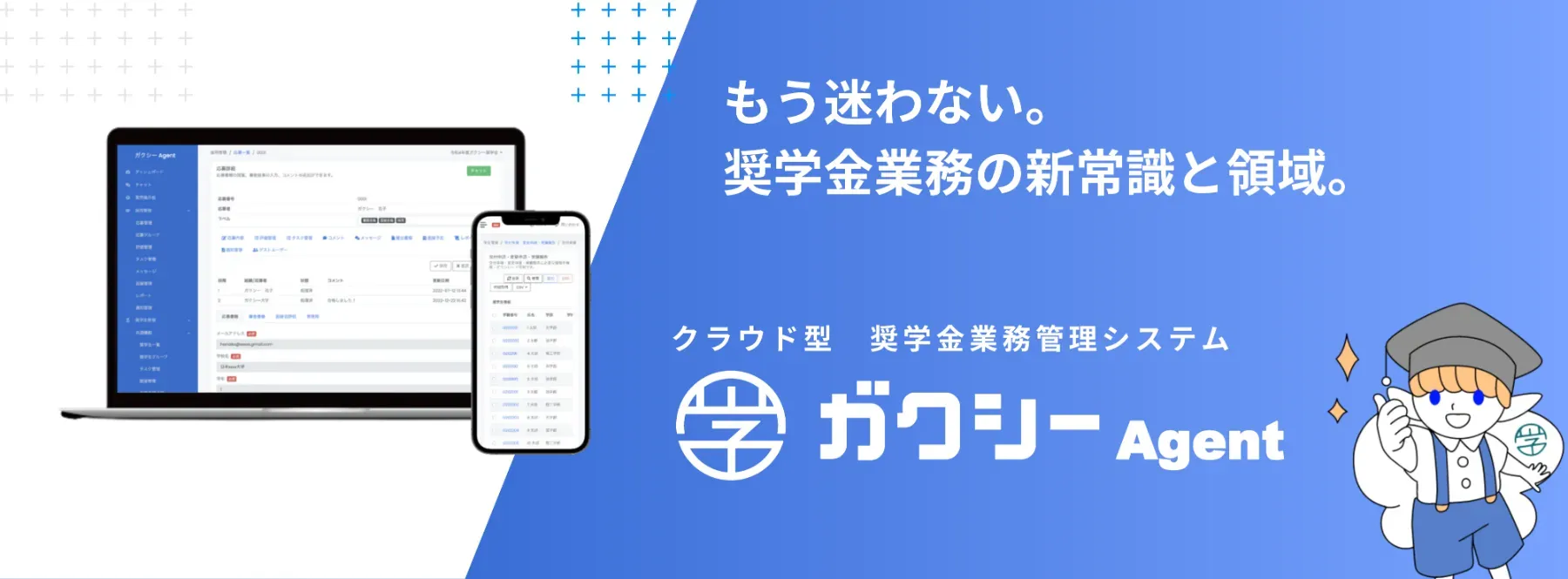
RM: JASSO handles the final organisation, but the university itself is responsible for all the time-consuming factors, such as communicating with students throughout the application process. Therefore, the GAXI agent also helps with that.
(Y: I had no idea. That's a very helpful solution. )
RM: It's probably not widely known. Based on our research, we discussed this with our CTO and decided to develop a system.
We found that universities are finding it tiresome to carry out a significant portion of the work related to JASSO scholarships. We believed that if we could create a system to address this difficulty, we could do so uniquely, without competition.
Scholarships: Your powerful tool, not a debt
(Y: The lack of information is very detrimental for students...)
RM: That is true. As mentioned earlier, scholarships only cover 10% of the money needed for education, and the concept of scholarships is not yet widely understood. Many people do not tell others even if they receive a scholarship. It must be hard for them to be seen as someone who is on scholarship and having a hard time making ends meet.
(Y: I also received a benefit scholarship when I was a student, and I was awkward because I felt like I was seen as such.)
RM: I know a certain number of students are allergic to scholarships. The moment they hear the word scholarship, they assume it is a debt and stop thinking about it.
For us, moving forward, it's crucial to cultivate a new perception of scholarships. We want students to see them as essentially a benefit and support that doesn't need to be repaid – a valuable tool, a real asset for them. We see it as an important part of our activities to create this kind of image. Therefore, we see it as our mission to constantly and continuously provide information on scholarships that students can receive.

(Y: Is it free for students to use?)
RM: Yes, absolutely. Previously, universities primarily announced scholarships by putting up notices on notice boards. With the increasing number of scholarships available recently, they've had to display a large number of these. Consequently, information can easily be missed if the institution or the person in charge isn't particularly proactive. Alternatively, GAXI provides a central point for all this information.
Addressing societal challenges through business
Business viability: the difficulty of ventures tackling societal issues
(Y: Japan is a country facing many challenges ahead of others. How are addressing social issues and doing business connected?)
RM: GAXI is the second company I've started, and I began with the aim of doing something for Japan. Japan is indeed a country with numerous challenges, so our approach is that by working on initiatives for Japan, we are inherently solving social issues.
Starting a business depends on your objectives, but for me, I want to scale up. Therefore, it's crucial that the venture is commercially viable if I'm aiming for a sustainable structure and expansion. I believe the only way to achieve this is to create a model that strikes a balance, roughly fifty-fifty, between business viability and addressing social problems. Passion alone isn't sufficient.
(Y: Many foreigners, including our readers, are doing business in Japan, aiming to address social challenges, or are international students wanting to launch their own ventures here. There are many hurdles to overcome in such cases. Can you give any advice for such people?)
RM: It's certainly true that it's never easy for foreigners to do business in Japan. I hope they can learn more Japanese and become more familiar with Japan if possible. Of course, the same applies in reverse to the English language skills of Japanese people. When I was involved in global recruitment previously, I felt that the English language skills of Japanese companies on the receiving end were also a barrier.
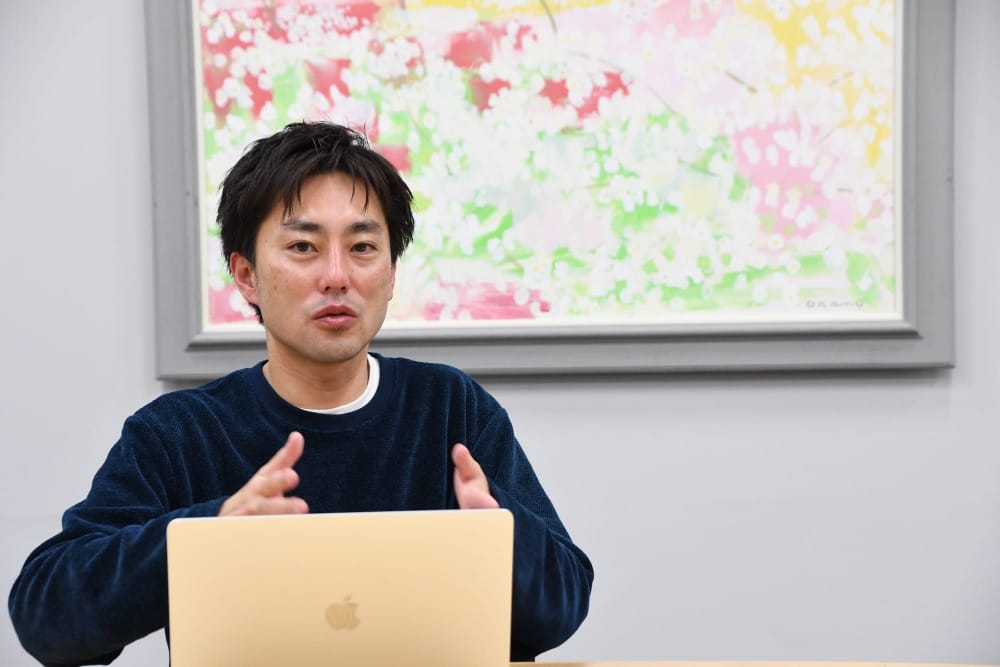
Furthermore, to reiterate, it's impossible to succeed without both addressing social issues and being commercially viable. In general business, the basic model is to receive payment from those who benefit from your services, but this is difficult to achieve when tackling social problems. We can't get money from students either.
Given this, the level of difficulty of the business is high, and there aren't many readily available exit options, such as a listing or IPO. It would be beneficial to have an objective way to evaluate a company's positive impact on society, rather than solely focusing on profits. While there have been some recent discussions about IPOs for social impact projects, the system isn't yet established. Nevertheless, I believe that addressing social issues in Japan will become a profitable business in the future. It holds social significance, so I would encourage people to get involved.
Partnering with like-minded individuals is advantageous. In my case, I have two other very talented co-founders: Masayoshi Adachi, CTO, and Yasuyoshi Daikuhara, CMO, and we started as a team of three. We then considered what we could contribute to Japan's future, which ultimately led us to where we are today.
System growth, societal benefit
(Y: You can pave the way for this kind of path.)
RM: I hope we can make it happen. We have simply created a system that will naturally make the world a better place as our business expands. The bottom line is that the more people register on the site, the more scholarship information gets out there, and the more people use the system, the easier it will be for scholarship officers. If we set up a convenient system that makes it easy for funders who want to support young people to create scholarships, there will be an increase in benefit-based scholarships, and as a result, it will be easier for students.
My personal ideal would be that when the GAXI name spreads, people see our business figures and say, 'Wow, you can achieve such big figures.' Thus, I hope that someone who sees this will realise it's possible to succeed in business by tackling social challenges like scholarships, and that we can become a benchmark attracting talent, although we still have a long way to go. When we started the company, there was so little information available at all. Recently, though, competitors have emerged, so I suppose it is now recognised as a promising market.
Taking on the 'last mile' of donation
(Y: What are your future goals?)
RM: First and foremost, we want to change the image of scholarships in Japan to 'it is a privilege to receive a scholarship', as it is in other countries. As a business, one of our goals is to have an IPO.
(Y: In the course of developing your sales, you have also offered to create scholarships for organisations that are potential customers.)
RM: Yes. There are quite a few companies and high-net-worth individuals who are interested, but there are cases where they stop because setting up a foundation is too complicated, and they don't know how to do it. That's where we come in and suggest that it can be done easily as the 'last mile' in setting and connecting donors with students.
We are also starting to combine scholarships with existing schemes. For example, a percentage of profits made on stock transactions could be used for scholarships, or 1% of the amount spent on credit cards could be donated to scholarships.
I believe that many foreigners have helped spread scholarship and donation culture in Japan, so I hope that they will continue to be active in this area. Also, GAXI would like to introduce information on scholarships offered by Japanese universities for international students in the future.




